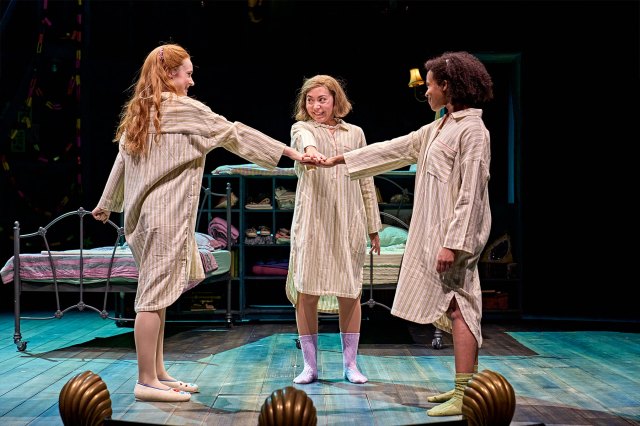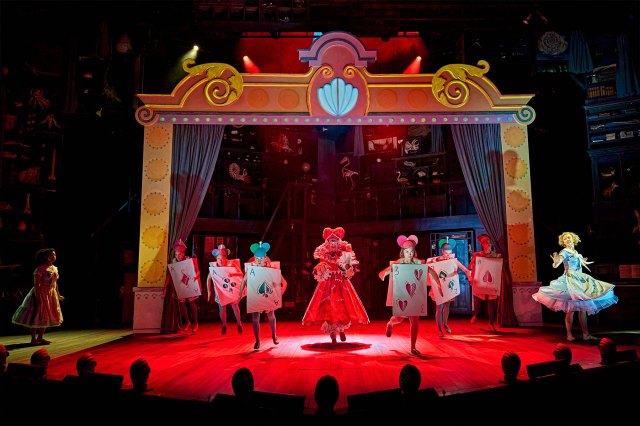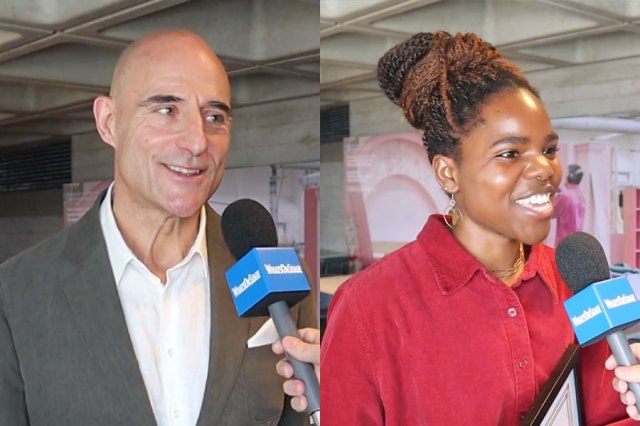Ballet Shoes at the National Theatre review – springs from page to stage with panache
The world premiere stage adaptation, directed by Katy Rudd, runs on the Olivier stage until 22 February

There are perils to adapting a much-loved children’s novel – especially one never out of print since its publication in 1936. Noel Streatfeild’s story of the enterprising Fossil sisters, three adopted orphans making their way in the world is so charming and offbeat on the page, it’s hard to imagine it translated to the stage.
But adaptor Kendall Feaver and director Katy Rudd have done a magnificent job. They have altered the plot of the novel, making it both more and less full of incident, stripped away some period detail and added contemporary base notes. Yet they have absolutely remained true to the spirit of the book, and its hope-filled moral of making the best of yourself and determining your own future.
Above all the staging, fluidly choreographed by Ellen Kane (with Jonathan Goddard), creates its own magic, making a story that is full of love for the self-realising powers of theatre and dance into a transformative experience in itself.
There are moments when Frankie Bradshaw’s substantial set of the many floors of a Victorian town house seems to melt away and Paule Constable’s smoky lighting conjures miracles: a boat tossed in an Arctic storm where Great Uncle Matthew (GUM, as he is affectionately known), eccentric palaeontologist and explorer finds his first abandoned baby to send home; a car driving at speed through a foggy London; a dying dancer seeing the reflection of her younger self. The entire world of Ballet Shoes is presented by sleight of hand, some mirrors, and a hard-working chorus in turquoise tutus.
At its heart are the three contrasting Fossil girls: Pauline (Grace Saif), more bolshie than in the book, but ultimately in love with acting; Petrova (Yanexi Enriquez), an engineer manqué who dreams of being a pilot and Posy (Daisy Sequerra) whose mother inspires her ambition to be a ballerina when she abandons her with only a pair of ballet shoes.

All live with their guardian Garnie (a reassuringly spirited Pearl Mackie) and an oddball assortment of lodgers who increasingly come to form a supportive if unusual family. To earn a living, they train at the “Children’s Academy of Dancing and Stage Training” which provides performers for plays and entertainments.
Glimpses of these are affectionately recreated in action and movement that sweeps across the Olivier’s open spaces: a fake proscenium arch frames a performance of Alice in Wonderland with coy rabbits and a dancing caterpillar. Later an “avant garde production” of A Midsummer Night’s Dream has the cast in ridiculous robot costumes, until Petrova is set flying across the auditorium, literally spreading her wings as she achieves her ambition to fly.
The colour and liveliness of these scenes is balanced by a backstory that emphasises the hardship of the Fossils’ backgrounds. They are being brought up in a house full of women who need to work for a living. In this adaptation Garnie is given a series of jobs, and a suitor in the attractive shape of Jai Saran (a graceful and witty Sid Sagar), a refugee who is pursuing his own dream of opening a garage.
Her lodgers Theo (a dance teacher) and Doctor Jakes (a lesbian professor, driven out of her teaching job) are making their own independent way in the world. Nana, Garnie’s helpmate, is a resolute coper, determined to bring up the sisters as best she can. All are played with wonderful detail and a fine sense of fun: as Theo, Nadine Higgin brings true joy to dancing, Helena Lymbery adds conviction to a belief in the importance of words and Jenny Galloway is wonderfully dry as Nana. “The best kind of family is the one you chose,” Doctor Jakes tells Pauline at one point, and this bustling bunch are exactly the group everyone might pick if they had the opportunity.
Yet it is the dance teacher Madame Fidolia who most embodies the show’s belief in the uplifting qualities of art and its capacity to effect change, as a sequence in which she dreams of her dancing past and her flight from Russia becomes an affecting image of refugees and fear resolving into a life at the service of dance.
The aged émigrée is one of multiple parts, including GUM, and a harassed stage manager, that are played by Justin Salinger with an energetic abandon that sums up the appeal of this version of Ballet Shoes. It’s a Christmas show with heart, soul and a flurry of movement to sweep you away.
















